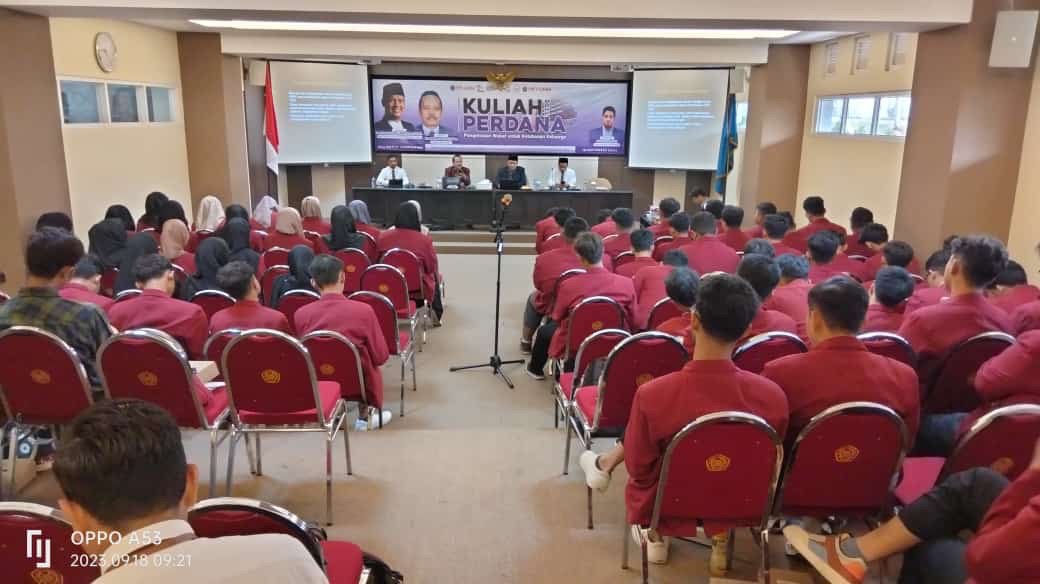
On Monday, September 18, 2023, the HKI Study Program held the inaugural lecture for the new students of 2023 with the theme "Endowment Management for Family Resilience." The lecture featured a Professor in the field of Endowment, Prof. Dr. Sudirman, MA., CAHRM, who is currently serving as the Dean of the Faculty of Sharia at UIN Maulana Malik Ibrahim, Malang. Additionally, the second speaker was Muhammad Sarif, M.Ag, a lecturer in HKI and an expert in the field of endowment, who is currently pursuing his doctoral studies at Universitas Muhammadiyah Surakarta. The event was moderated by Jamal, S.Sy., M.Sy, and attended by all new students of the HKI Study Program class of 2023 and the HKI faculty members.
The event, which took place at GKB 4, 4th Floor, was officially opened by the Dean of FAI UMM, who explained that endowment (wakaf) is one of the main strengths of Muhammadiyah. The power of Muhammadiyah as the recipient and manager of endowment is extraordinary. Therefore, HKI alumni must have potential and competence in the field of endowment. "Islamic studies, or Sharia, used to be dominated by theology, but now Sharia has become the master in modern times," said the Dean of FAI UMM in his opening remarks.
In his lecture, Sarif emphasized that HKI students have great opportunities to hold strategic positions in society, especially now with the degree of S.H., which is no longer S.H.I. This opens up more opportunities for HKI alumni to practice their Sharia knowledge, particularly in the field of endowment. Indonesia adheres to the system of Positive Law, so all regulations must have a legal basis that has been codified, and endowment now has a legal foundation established in the law. "Endowment is an economic strength for Muslims. One example is a hotel in Mecca purchased by the people of Aceh to be endowed. The proceeds from this productive endowment are partly donated to the people of Aceh who are performing the Hajj in Mecca," said the HKI lecturer, who is also actively involved as a Nadzir (endowment manager) in Malang.
"All assets in Muhammadiyah are officially registered under Muhammadiyah's name, not the individual giver of the endowment. The profession of Nadzir, as an official manager who receives certification after participating in training from the Indonesian Endowment Agency, is now crucial and presents an opportunity for HKI alumni. This profession is vital for the sustainability of endowment management in Indonesia. One of the current challenges in endowment is that it is primarily used for the construction of community facilities and infrastructure, and has not been maximized for more progressive productive endowment. This shows that the Muslim community actually has strong economic potential, which can contribute to family and community resilience in general," he added.

Continuing with the next material presented by Sudirman, he explained that the history of endowment (wakaf) began with Prophet Adam. The Kaaba was the first endowment made by Prophet Adam. Utilizing endowment assets according to their purpose is the goal of endowment implementation. The function of endowment is to realize the potential and economic benefits of endowment assets for religious purposes and to advance public welfare.
"Previously, endowment was more associated with land endowment. This is evidenced by the enactment of Law No. 5 of 1960 on the Basic Agrarian Law, which was strengthened by Government Regulation No. 28 of 1977 on Land Endowment Ownership. Since the enactment of Law No. 41 of 2004, endowment assets are no longer limited to land, but have developed into various types of endowments, including movable assets," he explained.
In terms of family resilience, which is defined as the ability to adapt and overcome various pressures in the present and future, a family that is capable of adapting to environmental changes is likely to have good family resilience. An ideal family has four types of resilience: physical resilience, psychological resilience, social resilience, and economic resilience. It is through endowment that the potential for economic resilience in families can be realized. (LA)